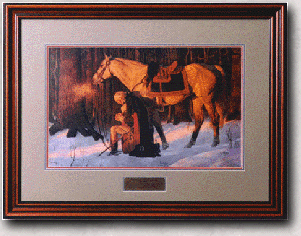|
|
 "THE PRAYER AT
VALLEY FORGE", originally painted by Arnold Friberg, RSA, in
celebration of our country's 1996 bicentennial celebration. The words
on the brass insert (the open edition framed version) were spoken
by George Washington as he resigned his commission as general of the
Continental Army on December 23, 1783.
"THE PRAYER AT
VALLEY FORGE", originally painted by Arnold Friberg, RSA, in
celebration of our country's 1996 bicentennial celebration. The words
on the brass insert (the open edition framed version) were spoken
by George Washington as he resigned his commission as general of the
Continental Army on December 23, 1783.
"I consider it an indispensable duty to close this last solemn act of my official life by commending the interests of our dearest country to the protection of Almighty God and those who have the superintendence of them into His holy keeping."
Friberg writes, "Since I was a boy, I have revered General Washington. At age twelve I drew what I thought a fine picture of him astride his white horse. Along with learning the American legend of his praying at Valley Forge, this deep inspiration of boyhood was never to leave me.
And so it was that I waited many years to picture him again, in prayer now, in the snow, dismounted from his strong horse - only this time in the full power and richness of oil colors.
To prepare for this painting, to insure accuracy in trees and landscape, I made a pilgrimage to Valley Forge, in the dead of winter. In the summer the place is filled with visitors. But now, in the snows of February, it was deserted, the wind moaning through the great trees - silent, lonely, cold. It was a cold that chilled to the bone, a cold that froze my fingers until I could no longer sketch nor even snap my camera.
To insure accuracy in man-made things, I sought out whatever museums, collections, libraries, or informed individuals could offer on horse gear or uniform. At the Smithsonian Military History Museum, I made minutely accurate sketches from the very uniform actually worn by Washington.
As for facial likeness, I studied every portrait ever sketched, carved, or painted from life, but always keeping in mind how cold and rawboned he must have looked during that winter encampment.
But such research, vital as it is, provides only physical facts. What I really tried for was, through the medium of paint, to recall the pain, the cold of that cruel winter of 1777-78. I sought to pay tribute to the tall and heavy-burdened man who alone held our struggling nation together.
For while the British grew fat and warm and well fed in Philadelphia, it was the man Washington who stayed with his starving and freezing army through that dreadful winter at Valley Forge. It was in desperation that he wrote to the governor of New Jersey, "Our sick naked, our well naked, our unfortunate men in captivity naked!" With his own countrymen indifferent to their condition, where else could he turn but to God?
It should be plain to anyone that this is a symbolic picture, rather than a historically recorded event. The well known American legend is without documentation. But from Washington's own words there can be no doubt of his deep and humble dependence upon whom he chose to call "that all wise and powerful Being on whom alone our success depends."
It is my hope that coming through this picture will once again whisper the spirit of Valley Forge, of suffering and devotion and pain, of liberty, and of the hand of God in the affairs of men." |